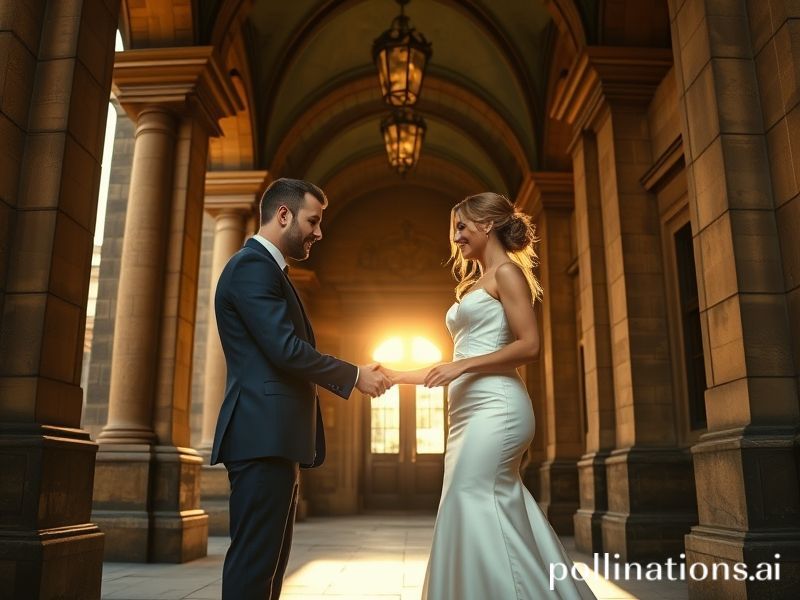Britain’s Latest Export: Heartbreak on a Budget—Why the World Is Watching Married at First Sight UK
The Arranged Marriage Arms Race: How “Married at First Sight UK” Became a Geopolitical Weapon
Every empire eventually exports its most embarrassing habit. The Romans gave the world vomitoria; the British, queueing and now—via a glossy Channel 4 franchise—step-by-step instructions on how to commodify intimacy for binge-watching nations with abandonment issues. “Married at First Sight UK” (MAFS UK) may look like harmless reality fluff, but from the vantage point of anyone watching outside the island, it is Britain’s sleekest post-Brexit soft-power flex: a Trojan horse stuffed with wedding cakes, surveillance cameras, and the faint whiff of imperial nostalgia repackaged as “social experiment.”
Consider the optics. While the U.S. edition has devolved into a Louisiana mud-wrestling pit and the Australian version resembles a never-ending Bondi Beach hostage crisis, MAFS UK delivers its chaos with that uniquely British talent for appearing polite while eviscerating everyone involved. The result is a program that plays like Downton Abbey scripted by divorce lawyers—crumpets, passive aggression, and a prenup that might as well be carved on a stone tablet.
Globally, the show has become a data-mining goldmine for sociologists, marketing firms, and, if rumors from Davos are correct, certain dating apps now valued higher than some Baltic GDPs. In Singapore, civil servants reportedly study the “experiment” as a cautionary tale about declining marriage rates. In Lagos, bootleg DVDs arrive subtitled in Yoruba with the ironic tagline “See how the colonizers ruin love faster than malaria.” Meanwhile, Scandinavian diplomats, ever the moral yardsticks of Europe, have begun citing MAFS UK in white papers on the ethical limits of televised consent—right next to their footnotes on whale hunting.
The show’s worldwide ripple effect illuminates a universal truth: arranged marriage never really disappeared; it just got venture capital. From Mumbai to Utah, algorithms have replaced aunties, and MAFS UK is the loudest proof that the free market will happily arrange your heartbreak if the lighting budget is high enough. One can almost hear the ghost of Adam Smith whispering, “The invisible hand swipes right.”
Yet beneath the confessional-couch tears and staged honeymoon tantrums lies a darker export: a blueprint for monetizing loneliness. Emerging markets now rush to franchise the format, swapping tea and scones for local delicacies—tacos in Mexico City, borscht in Kyiv—while keeping the core ingredient intact: cameras pointed at humans willing to mortgage their dignity for a follower spike. The United Nations, already exhausted by actual wars, has thus far issued only a terse press release reminding member states that Article 16 of the Universal Declaration of Human Rights says nothing about Instagram verification.
Ironically, the only country that seems immune is France. Their culture ministry dismissed the program as “emotional McDonald’s,” which is Gallic shorthand for “we already have Jerry Lewis; we’ve suffered enough.”
So what does it all mean for the average viewer in São Paulo or Seoul? Simply this: MAFS UK is not just car-crash television; it is the quarterly earnings call for late-stage romance. Every rose ceremony is a futures contract on human disappointment, every slow-motion tear a dividend paid to advertisers selling antidepressants and meal kits. The planet now watches Britain auction off its last semi-functional tradition—monogamy—and discovers the reserve price is shockingly low.
In the end, the show offers a bleakly democratic spectacle: whether you live under a constitutional monarchy or an actual one, heartbreak comes subtitled in your language, monetized by the same four media conglomerates, and delivered with the same chirpy voice-over reminding you that “love is a risk worth taking.” Which, translated from corporate, means: “Please don’t notice the subscription auto-renews.”
If this is the future of international relations, one shudders to imagine the next summit. Picture world leaders signing trade agreements over group therapy sessions, tariffs negotiated via trust falls. Until then, keep an eye on the ratings—because when the final couple says “I do,” someone, somewhere, is updating their national security briefing.







